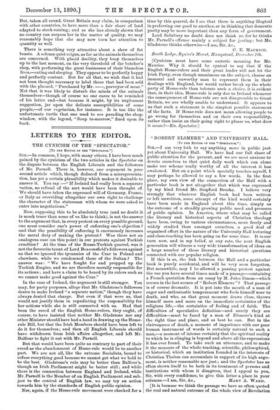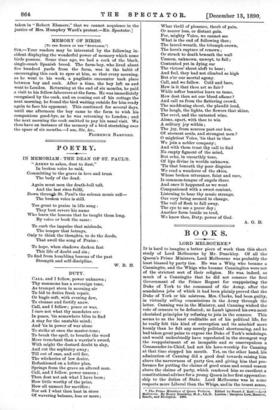"ROBERT ELSMERE " AND UNIVERSITY HALL.
ITO THE EDITOR or TEE " 1211PECTATOR." J SIR, —I am very loth to say anything more in public just yet about University Hall. We have had our full share of public attention for the present, and we are most anxious to devote ourselves to that quiet daily work which can alone make our scheme really worthy of all the interest it has awakened. But on a point which specially touches myself, I may perhaps be allowed to say a few words. In the first place, my own view of the connection of the Hall with a particular book is not altogether that which was expressed by my kind friend Mr. Stopford Brooke. I believe very strongly that whatever English book had been written or left unwritten, some attempt of the kind would certainly have been made in England about this time, simply as the outcome of a steadily growing public need and pressure of public opinion. In America, where what may be called the literary and historical aspects of Christian theology have been, owing to various circumstances, more freely and widely studied than amongst ourselves, a good deal of organised effort in the nature of the University Hall lecturing and class-teaching has been going on for some time. It is our turn now, and in my belief, at any rate, the next English generation will witness a very wide transformation of ideas on a large number of these literary and historical questions connected with our popular religion.
If this is so, the link between the Hall and a particular book is purely accidental, and will be very soon forgotten. But meanwhile, may I be allowed a passing protest against the use you have several times made of a passage—containing a French quotation from an essay by M. Jules Simon—which occurs in the last scenes of " Robert Elsmere " P That passage is of course dramatic. It is put into the mouth of a man of eager and enthusiastic temperament who feels himself near to death, and who, as that great moment draws close, throws himself more and more on the immediate certainties of the religions life,—the certainties of feeling and of faith. The difficulties of speculative definition—and surely they are difficulties—must be faced by a man of Elsmere's kind at the right time and place, and as best he can. But in the clairvoyance of death, a moment of impatience with our poor human instrument of words is certainly natural to such a man,—a moment of intense certainty that the spiritual reality to which he is clinging is beyond and above all the expressions it has ever found. To take such an utterance, and to make it the measure of the whole teaching, scientific, philosophical, or historical, which an institution founded in the interests of Christian Theism can accumulate in support of its high argu- ment, is neither reasonable nor just ; and the Spectator has so often shown itself to be both in its treatment of persons and institutions with whom it disagrees, that I appeal to you, Sir, with every confidence, to give this letter a place in your columns.—I am, Sir, &c., MARY A. Wean. [It is because we think the passage we have so often quoted the real and natural outcome of the whole view of Revelation
taken in " Robert Elsmere," that we cannot acquiesce in the justice of Mrs. Humphry Ward's protest.—ED. Spectator.]











































 Previous page
Previous page